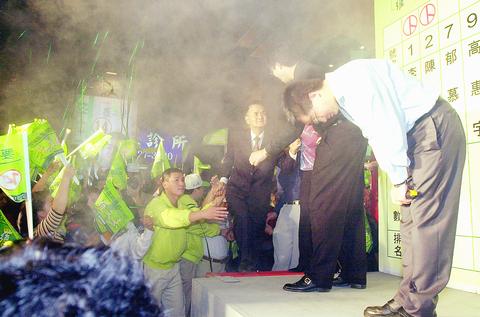The DPP got its wish: To become the largest party in the legislature.
By the time the ballot counting was finished yesterday, the party had captured 87 seats in the lawmaking body -- winning 36 percent of the vote. The DPP also replaces its arch rival the KMT as the largest party in the legislature.
Though the outcome is inadequate to secure the party majority control of the legislature, the results are expected to make it easier for President Chen shui-bian (

PHOTO: CHIANG YING-YING, TAIPEI TIMES
In the run-up to yesterday's polls, the main opposition parties painted the contest as a referendum on the Chen administration.
The KMT, swept from its long grip on power last year, finished a distant second with 73 seats, down from 123 in the previous legislative elections in 1998. The former ruling party had hoped to retain at least 85 seats, which would have allowed it more voice in the formation of a post-election Cabinet.
The KMT has been eyeing those Cabinet posts responsible for making the nation's economic and financial policy.
KMT Chairman Lien Chan (
While he made no mention if he or any other party official would step down to take responsibility for the KMT's poor showing in the polls, he did hint that he might have changed his mind on the idea of working with the DPP administration.
``We did not win,'' said Lien. ``But we are still the largest opposition party. We will step up negotiations with others, so we can together help stabilize politics.''
As anticipated, the elections confirmed the People First Party's (PFP) standing as the third largest party in Taiwan. The party bagged 46 seats with 20 percent of the votes, successful doubling its presence in the legislature.
The vote count, though impressive, was not enough to secure PFP Chairman James Soong (
The Taiwan Solidarity Union (TSU) emerged as a big winner, increasing its number of seats in the legislature from one to 13. The party also passed the 5 percent threshold needed to win legislator-at-large seats and campaign-matching funds.
But the DPP and TSU's seats are not enough to give the "pan-green" alliance the votes needed to overcome opposition resistance and pass the government's policy initiatives in the legislature.
The New Party was undoubtedly the biggest loser in the legislative races. The pro-unification party retained only one seat representing Kinmen, down from 11 in the 1998 polls.
The party failed to meet the 5-percent threshold, denying it the rights to claim legislator-at-large seats or form a caucus in the legislature.
Some New Party members have talked about rejoining the KMT to keep its pro-unification cause alive.
Not surprisingly, John Chang (章孝嚴), the illegitimate son of late president Chiang Ching-kuo (蔣經國) and a former foreign minister, won a seat from the southern district of Taipei City with 46,263 votes.
Other big-name candidates winning seats were the DPP's Lou Wen-chia (
A high percentage of incumbents lost their bid to win elections. They include New Party lawmakers Hsieh Chi-ta (

MAKING WAVES: China’s maritime militia could become a nontraditional threat in war, clogging up shipping lanes to prevent US or Japanese intervention, a report said About 1,900 Chinese ships flying flags of convenience and fishing vessels that participated in China’s military exercises around Taiwan last month and in January last year have been listed for monitoring, Coast Guard Administration (CGA) Deputy Director-General Hsieh Ching-chin (謝慶欽) said yesterday. Following amendments to the Commercial Port Act (商港法) and the Law of Ships (船舶法) last month, the CGA can designate possible berthing areas or deny ports of call for vessels suspected of loitering around areas where undersea cables can be accessed, Oceans Affairs Council Minister Kuan Bi-ling (管碧玲) said. The list of suspected ships, originally 300, had risen to about

DAREDEVIL: Honnold said it had always been a dream of his to climb Taipei 101, while a Netflix producer said the skyscraper was ‘a real icon of this country’ US climber Alex Honnold yesterday took on Taiwan’s tallest building, becoming the first person to scale Taipei 101 without a rope, harness or safety net. Hundreds of spectators gathered at the base of the 101-story skyscraper to watch Honnold, 40, embark on his daredevil feat, which was also broadcast live on Netflix. Dressed in a red T-shirt and yellow custom-made climbing shoes, Honnold swiftly moved up the southeast face of the glass and steel building. At one point, he stepped onto a platform midway up to wave down at fans and onlookers who were taking photos. People watching from inside

Japan’s strategic alliance with the US would collapse if Tokyo were to turn away from a conflict in Taiwan, Japanese Prime Minister Sanae Takaichi said yesterday, but distanced herself from previous comments that suggested a possible military response in such an event. Takaichi expressed her latest views on a nationally broadcast TV program late on Monday, where an opposition party leader criticized her for igniting tensions with China with the earlier remarks. Ties between Japan and China have sunk to the worst level in years after Takaichi said in November that a hypothetical Chinese attack on Taiwan could bring about a Japanese

The WHO ignored early COVID-19 warnings from Taiwan, US Deputy Secretary of Health and Human Services Jim O’Neill said on Friday, as part of justification for Washington withdrawing from the global health body. US Secretary of State Marco Rubio on Thursday said that the US was pulling out of the UN agency, as it failed to fulfill its responsibilities during the COVID-19 pandemic. The WHO “ignored early COVID warnings from Taiwan in 2019 by pretending Taiwan did not exist, O’Neill wrote on X on Friday, Taiwan time. “It ignored rigorous science and promoted lockdowns.” The US will “continue international coordination on infectious